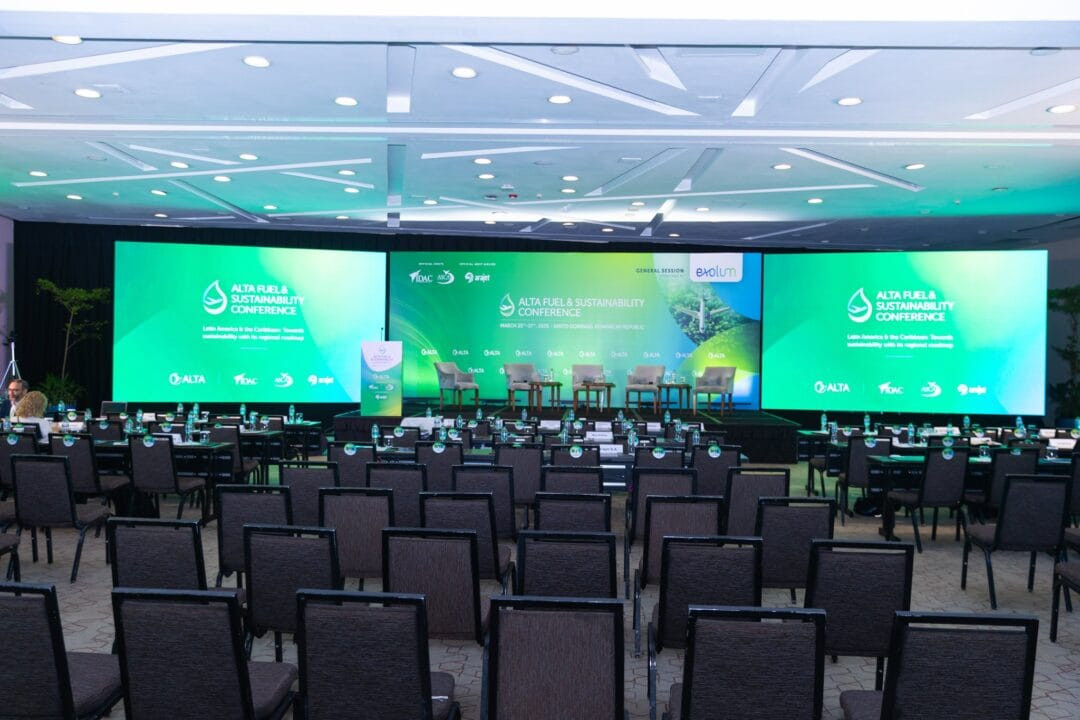
Santo Domingo, March 27, 2025 – on the second day of the “Alta Fuel and Sustainability Conference”, aviation sector experts stressed the urgency of the establishment of clear government policies to enable energy transmission and ensure the sustainability of this basic service in the region.
The intercourse, which was organized by the Air Transport Association in Latin America and the Caribbean Sea region (ALTA), between representatives of airlines, suppliers, manufacturers and authorities to discuss the main challenges and opportunities related to the removal of carbon from the sector.
Marco Larson, head of sustainability in Sky, has warned that the lack of the specified organization in Latin America hinders the planning of the long -term sustainable initiative. “Although Sky runs a very effective fleet in the region, and avoids more than a million tons of CO₂, the lack of clear rules creates uncertainty for investments in solutions that reduce carbon emissions,” he said.
The President of Boeing Company in Latin America and the Caribbean Sea region, Landon Lomes, stressed the company’s commitment to support customers and governments around the world in their aspirations for the future of space. “The expansion of the use of technologies that support our customers, such as SAF, Electric and Hydrogen, depends on public policies that enhance production and reduce costs. Boeing has already conducted more than 800 test flights with SAF and performs the search in electrical and hydrogen, which puts itself to check new solutions. “
The circular economy was also highlighted as one of the emissions limit strategies. Johanna Cabrara, the director of sustainability at Latam, confirmed initiatives such as eliminating a single use plastic materials, replacing them with environmentally friendly materials, and cooperating with suppliers to adopt more sustainable practices. “Latam has reduced 129 tons of food waste on board with better predictions of passenger behavior and requires waste recycling and tracking it from its partners, which enhances its leadership in sustainability in the aviation sector,” Kapura pointed out.
Biological fuel: challenges and opportunities
Pedro De La Fuente, Director of Sustainability, Politics and Standards in IATA, highlighted the importance of cooperation and implementing new technologies to meet the increasing demand for SAF. Judit de Leon, IDAC’s development director, emphasized the capabilities of Latin America to produce biofuels from local waste, but warned that the process of issuing certificates may take up to five years, delaying the expansion of the sector.
Manuel Garcia Perez, Professor and Head of the Department of Biological Systems Engineering at Washington State University (WSU), emphasized the need to reduce capital costs to build and operate vital fuel plants, noting that the choice of raw materials, such as used or ethanol, directly affects the final cost. “It is necessary to create government incentives packages to enable production and expand the SAF scope in the region,” he stressed.
According to Debnil Chowdhury, the Vice President of Research, Fuel and Refining in the Western Hemisphere in the S& Pl Global will grow, and the demand for flying fuel in Latin America and the Caribbean region in the coming years, but the region will continue to rely on imports from the United States, which represents about 50 % of total consumption. “The growth of the aviation fuel market is seen as an opportunity, but the refining of power in Latin America is still sufficient to fulfill demand.”
The future of the sustainable supply chain
Experts have strengthened the importance of managing the responsible supply chain to advance sustainability. Liliana Touvar, Vice President of Aviation and Navy at Terpeel, called for the organizational compatibility in Latin America to facilitate the adoption of sustainable practices. “It is necessary to train suppliers on the use of renewable energies and monitor the origin of the inputs, as well as organizational compatibility in the region to facilitate the adoption of sustainable practices, while highlighting the region’s capabilities to generate biomass.”
Mariano Guterres, director of aviation at Peru, stressed the importance of innovation in Latin America, citing oil collection programs used to produce biofuels. “We must think not only about organizational issues but also technological progress, ensuring tracking all over the supply chain.”
Effective fuel policies: an essential step for competitiveness
The flexibility of fuel quality policies was also a topic for discussion. Experts stressed the need to adopt more efficient standards to expand the range of aviation fuel and reduce operational costs while ensuring the safety of the sector in the region and its competitive ability.
One of the points raised was the possibility of allowing the Jet A and Jet A-1 to use. While both flying fuel are derived from kerosene, there are differences in its specifications and prices. Alexandra Calvo, IATA’s commercial fuel manager, called for the progress of regulations that allow the use of both fuel options in the region. “Allowing the use of both Jet A and Jet A-1 expands the possibilities of supply and reduces the weaknesses of the width, which makes the processes more efficient.”
Louis Osiguida, the director of aviation sales on the western coast of America and Latin America in Chevron, warned that relying on one fuel type increases the airlines being exposed to crises, which may directly affect the continuity of air operations. Meanwhile, Stefano Gashit Carillo, the fuel manager in Latam, highlighted the challenges facing airlines due to organizational hardness in some markets, which increases costs and reduces competitiveness.
Discussions indicated that the transition to green aviation depends on clear regulatory frameworks, investment in innovation, and cooperation in all stages of the production chain. Merging regional and international efforts will be essential to ensure a more sustainable future for flying in Latin America and the Caribbean.